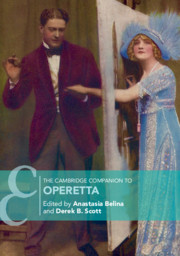Book contents
- The Cambridge Companion to Operetta
- Cambridge Companions to Music
- The Cambridge Companion to Operetta
- Copyright page
- Contents
- Illustrations
- Tables
- Music Examples
- Notes on Contributors
- Chronology, 1855–1950
- Introduction
- Part I Early Centres of Operetta
- Part II The Global Expansion of Operetta
- 6 Going Global: The International Spread of Viennese Silver-Age Operetta
- 7 Spain and Zarzuela
- 8 Camping along the American Operetta Divide (on the Road to the Musical Play)
- 9 Operetta in Russia and the USSR
- 10 Operetta in the Nordic Countries (1850–1970)
- 11 Operetta in Greece
- Part III Operetta since 1900
- Select Bibliography
- Index
- References
6 - Going Global: The International Spread of Viennese Silver-Age Operetta
from Part II - The Global Expansion of Operetta
Published online by Cambridge University Press: 14 November 2019
- The Cambridge Companion to Operetta
- Cambridge Companions to Music
- The Cambridge Companion to Operetta
- Copyright page
- Contents
- Illustrations
- Tables
- Music Examples
- Notes on Contributors
- Chronology, 1855–1950
- Introduction
- Part I Early Centres of Operetta
- Part II The Global Expansion of Operetta
- 6 Going Global: The International Spread of Viennese Silver-Age Operetta
- 7 Spain and Zarzuela
- 8 Camping along the American Operetta Divide (on the Road to the Musical Play)
- 9 Operetta in Russia and the USSR
- 10 Operetta in the Nordic Countries (1850–1970)
- 11 Operetta in Greece
- Part III Operetta since 1900
- Select Bibliography
- Index
- References
Summary
When Franz Lehár’s Viennese operetta The Merry Widow arrived London in 1907, it was not only one of the most remarkable West End hits but also the beginning of a new age of global entertainment. The reception took place worldwide and overcame national traditions to establish a new international show business in the early twentieth century. In consequence a cross-cultural exchange emerged confirming the ‘birth of the modern world’ at that time. Along with Lehár, a new generation of composers propagated the new style on the Continent, for example, Oscar Straus, Leo Fall and Emmerich Kálmán. In the decade before World War I, Viennese operettas dominated the repertory of the Western world. Balancing the ‘local’ and ‘global’ was an important aspect of their achievement, so it was no coincidence that all those composers originated from the Habsburg Empire. Thus, Lehár grew up as a son of a Czech-born, German-speaking military bandmaster and of a Hungarian mother, spending his childhood in seven different cities of Austria-Hungary. Life was similar for Leo Fall, who furthermore was Jewish like Oscar Straus, and Emmerich Kálmán. But they all worked in Vienna, the experimental laboratory for the arts generally and popular music especially.
Keywords
- Type
- Chapter
- Information
- The Cambridge Companion to Operetta , pp. 89 - 102Publisher: Cambridge University PressPrint publication year: 2019
References
Recommended Reading
- 2
- Cited by

